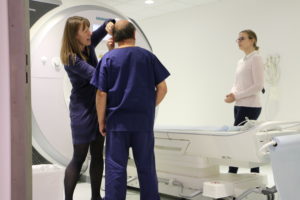Being diagnosed with a serious illness is often described as an unforgettable moment. In addition to the new information about the condition and treatment plan, patients who are parents also face the challenge of…
Innovative new Brain Health Centre – first of its kind in UK
The Oxford Brain Health Centre (BHC) has opened its doors to patients for the first time. Developed with the involvement of members of the public with lived experience of memory problems, the centre is a combined clinical and research service which has the potential to revolutionise NHS memory services.
COVID-19 and mental health research at Oxford Health BRC
New Programme Helps Frontline Healthcare Workers at Risk from PTSD and Depression
Researchers have developed a new mental health treatment programme to provide frontline workers with 1-to-1 support, including fast-track access to PTSD or depression treatment. This evidence-based programme, called SHAPE Recovery, builds on an outreach programme shown to reduce rates of PTSD and depression.
PPI in the time of COVID-19
New national study into the long-term health impacts of COVID-19
Study to explore mental health benefits of online cultural experiences
OxCADAT guidance for remote delivery of psychological therapies
Talk on evidence-based guidance for digital technologies and telepsychiatry during COVID19
Supporting mental health and resilience in first responders – operational training is most effective
Excessive mistrust linked to conspiracy beliefs reduces the following of government coronavirus guidance
Patient and Public Involvement: the journey so far
Clinical trials have come a long way since their initial conception many centuries ago. Patients and the general public are becoming increasingly involved in clinical trials and research in general. PPI Manager Claire Murray writes about how Patient and Public Involvement can inform clinical trials on International Clinical Trials Day 2020.
New guidance and resources to help patients cope with trauma after intensive care
Effects of Social Isolation and Lockdown on Adolescents in Oxfordshire
Let them know you care – social disconnection worsens mental health after a loss
Genetic risk factors for mental illness affect how children’s brains are wired up
New research funded by the NIHR Oxford Health BRC and published in Molecular Psychiatry, sheds light on the role of genetics in mental illness, suggesting that genes influence the way children’s brains are ‘wired up’. This difference in nerve connections within the brain serves as a ‘vulnerability network’ for later developing mental illness.





















